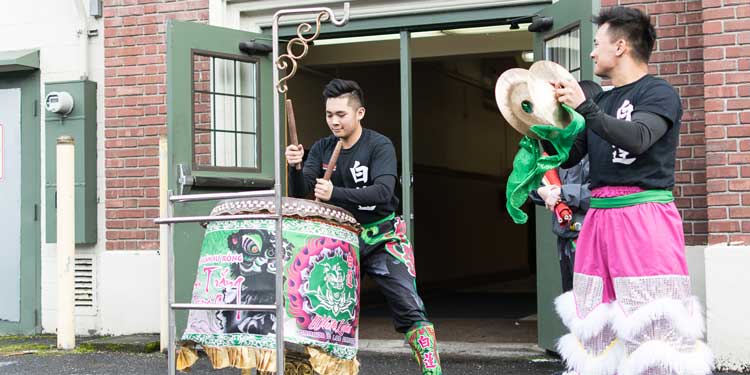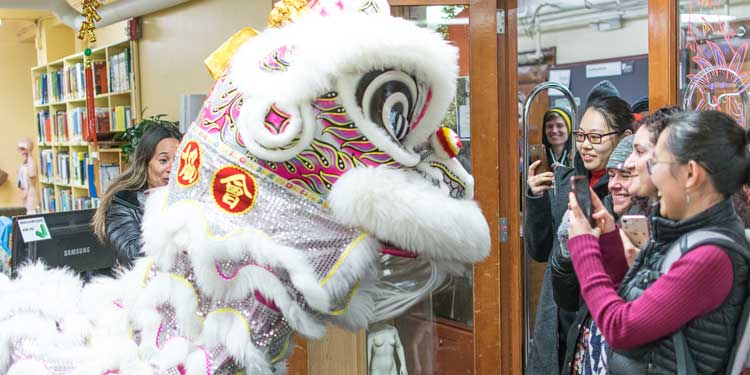Everything You Wanted to Know About Chinese New Year 2020 According to Classical Chinese Medicine
At NUNM, we celebrate Chinese New Year in a big way. Between dragons roaming our halls, special teas being poured and acrobatic dances, we know how to ring in the Lunar New Year on a high note. Join Heiner Fruehauf, PhD, LAc, and DSOM student Gregory Done as they explain the Chinese New Year—the Year of the Metal Rat—beginning January 25, 2020, and how it relates to classical Chinese medicine.

What is the History and Significance of the Chinese New Year?
The Chinese New Year, like New Year rituals in most traditional cultures, is a folk celebration to make sure that nature will wake and be reborn, and that spring will come again. One of ancient humanity’s biggest fears was that the sun wouldn’t return in the spring, leaving early peoples in eternal darkness and winter. Thus, in Chinese culture the New Year has traditionally been a ritual of gratitude for the end of winter and a celebration for the return of warmth, taking place at the first new moon of the year. For the last 2,000 years, that first new moon has occurred between mid-January and mid-February.
The Chinese Zodiac and Chinese Medicine
The wisdom of Chinese medicine says, “You go with nature, you will thrive. You go against nature, you will suffer.” And so was born a way to look at the natural world, of which humans are a part. The ancient Chinese understood nature, and by extension their world, as cyclical. They recognized the cycles repeated in hours of the day and months of the year, and in the 12- and 60-year more complex cycles of the zodiacal universe.
The Chinese zodiac features 28 stellar constellations that are organized in 12 houses, which are similar to the 12 astrological signs described by the ancient sky-watchers of Egypt, Sumer, Greece and Rome. Viewed from the northern hemisphere, these 12 constellations appear to be arranged like numbers on a clock around the constellation known as the Big Dipper. As the Dipper rotates in the center, its tail points at different positions on the heavenly clock face. Almost every culture in the northern hemisphere bases their agricultural year on the positioning of the Dipper, and the correlating position of the sun in the zodiac. The calculation of the 12- and 60-year cycles of the Chinese calendar also include the orbit of Jupiter, approximating 12 years in length, and a hypothetical position opposite Jupiter called Taisui (Counter-Jupiter). For 2020, Taisui’s position on the heavenly clock is marked by the sign of the Rat, making 2020 the Year of the Rat.
What Does the Year of the Rat Mean?
To understand the yearly cycles of the Chinese zodiac, it’s helpful to understand how these cycles manifest in both the months of the year and hours of the day, as well as their symbolic description by the ancient Chinese.
In the system of Chinese medicine, everything is described in terms of the movement of qi―the life force and energy that rules the macrocosm at large, as well as the microcosm of the human body. Nature’s qi moves in cycles: expanding and contracting; working and resting; flowing and stilling in predictable patterns throughout the day and the year. During the day, the ancient Chinese recognized 12 distinct periods of qi (each lasting two of our modern hours) and ascribed the personality of different zodiac signs to each. From the early morning hours attributed to the wakeful energy of the rabbit, to the midday hours assigned to the industrious horse. Similarly, months of the year were also assigned zodiac representations.
Both the hour of the Rat, 11 p.m. to 1 a.m., and the month of the Rat, in the early days of winter, are times of reflection, processing what came before, and germinating plans for what’s to come. Rat hour is a time when our bodies are typically sleeping, entering the first stages of dreaming when we disassemble and process the previous day. This feeling is magnified in the Year of the Rat, when we can focus on active imagination, breaking our dreams and plans into small parts and catalyzing the action to come.

What’s the Metal Rat?
In addition to the 12-year zodiac cycle, the ancient Chinese recognized an additional 60-year celestial cycle associated with our planet’s five phases, described by the elements of wood, fire, earth, fire, metal and water. So each year of the zodiac is modified slightly by an element. This Year of the Rat is associated with the element of metal. Metal in Chinese medicine represents the process of refining ore from the earth into precious metal like gold. So the metal rat is more refined, amplifying the themes of transformation, distillation, maturation and examination. In contrast to last year’s Earth Pig where the Qi was indulgent and warm, Metal Rat Qi is crisp, clear and sharp, enhancing the focus, tenacity and analytical thinking of Rat Qi.
Health and Wellness During the Year of the Rat
Chinese medicine invites you to be more aware of the cycles of nature, the energy in your body, and the world around you. What is nature doing from 11 p.m. to 1 a.m. or in the early days of winter? It is a time of waiting and planning; seeds and buds are readying themselves; we are analyzing what came before so we can act in a new way. The rat is a symbol of that analytical, planning energy.
The Rat also invites us to consider our interconnectedness, just as one individual rat is too small to accomplish much individually, we too as human beings are capable of so much greatness when we work together. The Year of the Rat invites us to consider where we may need to create alliances and support systems. And, like one rat can only carry a small grain, we must break big challenges into smaller pieces to get things done.
6 Things to do in the Year of the Rat
- Lean into rational, critical thinking. Whereas last year’s Earth Pig invited us to lean into our intuition and feelings, the year of the Rat invites you to look again. This is a year to question your gut instincts and let your head steer.
- Be deeply reflective and examine your life. What’s working? What’s not? What dreams would you like to build in the future? Now is a time to be honest with yourself.
- Create more interconnectedness in your life. It’s a wonderful year to immerse yourself in community, join a cause you care about and build your own personal village.
- Care for your financial health. Rats are cautious, careful and frugal and this energy can help set you up for financial success this year.
- Care for your mental health. Rats can be over-ambitious and prone to stress, anxiety, brooding and worry. Make sure to stop and check in with your own mental health and the health of folks around you.
- Care for your respiratory system: Chinese Rat Qi has an adverse effect on the Lung system and cold, coughs, asthma, flu, and fatigue may be exasperated.
Want to learn more about the Year of the Rat? Read Gregory Done’s in-depth analysis on his blog.